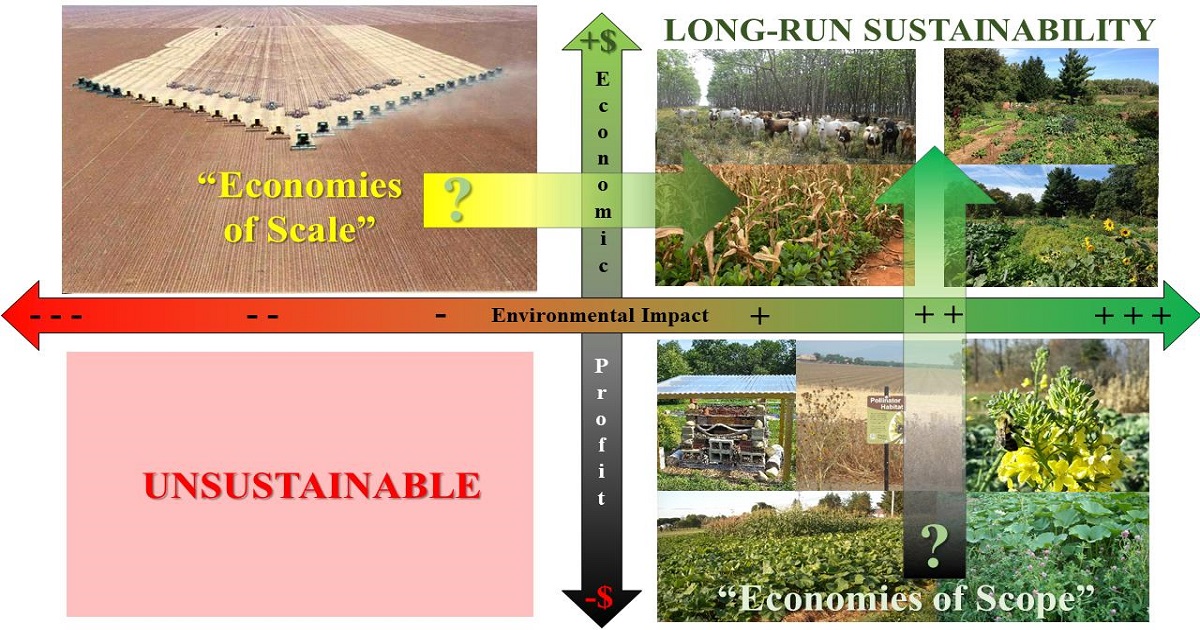Sustainable Agricultural Development Economics and Policy 2nd Edition
A special issue of Sustainability (ISSN 2071-1050). This special issue belongs to the section "Sustainable Agriculture".
Deadline for manuscript submissions: 31 August 2024 | Viewed by 1014

Special Issue Editor
Interests: agro-forestry economics; agricultural systems modeling; carbon sequestration; greenhouse gas emissions; sustainability
Special Issues, Collections and Topics in MDPI journals
Special Issue Information
Dear Colleagues,
Agriculture, in developing and developed nations, faces huge challenges over the next century in meeting human food needs and shifting preferences. Agricultural economic development, from the personal and local level to the global and industrial level, needs to be balanced with community needs (e.g. food sovereignty, self-sufficiency, etc.) and adaptable with the amplifying environmental challenges (e.g., climate change, ecosystem degradation, etc.). Local, national, and global policies need to support sustainable agricultural economic development, while also addressing future environmental and community impacts on agriculture.
Manuscripts submitted for this Special Issue can focus on any agricultural system in developing or developed nations. Submissions can analyze agricultural food systems from the personal and local level, all the way up to global commodities. Analysis can focus on economics (e.g., statistical models, non-parametric analyses, farm budgets and models, financial statements, etc.), however, the mathematics should be presented in such a way for a multi-disciplinary audience, and part of the discussion section needs to be devoted to policy recommendations. Alternatively, writing can be heavily focused on policy proposals, but economic data needs to be presented (e.g., summary statistical data from prior literature in the introduction).
This Special Issue seeks manuscripts addressing the myriad of sustainable future pathways for agricultural economic development across the world from both an economic and a policy perspective. This can involve agricultural producers, the private sector, non-governmental organizations (NGOs), as well as national governments. Past successful strategies can be applied to new locations, current applied research showcased, and future proposals highlighted. Analyses should address some combination of economics and policy which can be integrated with other academic focuses (e.g., bio-physical modeling, rural sociology, agronomy, etc.).
Sustainable agricultural development can be economically viable while reducing the environmental impact of agricultural activities, and improving local communities. From an economic perspective, sustainability can be achieved through “economies of scale”, by increasing economic efficiency and agricultural productivity, and this can spare land, in the short run reducing the need to convert natural habitats into areas for agriculture. While export commodity agriculture can employ local workers, the diversified food needs of local communities may not be addressed. Agricultural development of both intensive and extensive systems may be more challenging in the future given changes in climate, agro-ecosystem degradation, and diminishing resource availability. Articles published in this Special Issue could address how agricultural systems involving commodities may be less sustainable in the future, how these systems can be designed to be more durable to future shocks, and how sustainability shortcomings of the “economies of scale” approach can be addressed.
Alternatively, sustainable agricultural development can use “economies of scope” where agricultural producers diversify production and input use, using systems-based approaches. While such diversification can be profitable, minimizes environmental impacts, and meets local community food needs, these systems may be challenging, due to the complexity of managing the farmscape like an ecosystem adjusted to reduce input use, selling more directly to consumers, or the lack of available capital. Articles accepted to this Special Issue could address how government policies can be re-structured to support more diversified agriculture, how to improve stability of community supported agriculture (CSAs), or how micro-finance can be used to encourage greater “economies of scope.”
Dr. Aaron K. Hoshide
Guest Editor
Manuscript Submission Information
Manuscripts should be submitted online at www.mdpi.com by registering and logging in to this website. Once you are registered, click here to go to the submission form. Manuscripts can be submitted until the deadline. All submissions that pass pre-check are peer-reviewed. Accepted papers will be published continuously in the journal (as soon as accepted) and will be listed together on the special issue website. Research articles, review articles as well as short communications are invited. For planned papers, a title and short abstract (about 100 words) can be sent to the Editorial Office for announcement on this website.
Submitted manuscripts should not have been published previously, nor be under consideration for publication elsewhere (except conference proceedings papers). All manuscripts are thoroughly refereed through a single-blind peer-review process. A guide for authors and other relevant information for submission of manuscripts is available on the Instructions for Authors page. Sustainability is an international peer-reviewed open access semimonthly journal published by MDPI.
Please visit the Instructions for Authors page before submitting a manuscript. The Article Processing Charge (APC) for publication in this open access journal is 2400 CHF (Swiss Francs). Submitted papers should be well formatted and use good English. Authors may use MDPI's English editing service prior to publication or during author revisions.
Keywords
- sustainability agriculture
- development
- economics
- policy
- environment
- community
Related Special Issue
- Sustainable Agricultural Development Economics and Policy in Sustainability (26 articles)





